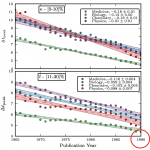I can’t read anymore what I would like to read — which isn’t unexpected with the doubling of papers in the last 10 years. The current rewarding system has such a focus on impact and publications – an over optimization where negative side effects are now beginning to dominate.
It is only a small relief that others are having similar problems, that are already recognized in the lay press. This is – don’t laugh – about another paper on “Attention Decay” by the same author wo wrote the Nobel Prize Delay. It looks at the publication spring tide
We have studied how attention towards scientific publications diminishes over time, due to the obsolescence of knowledge. For millions of papers in four different disciplines we find that after reaching a peak, typically a few years since publication, the number of citations goes down relatively fast. … The existence of many time-scales in citation decay and our ability to construct an ultrametric space to represent this decay, leads us to speculate that citation decay is an ultradiffusive process, like the decay of popularity of online content. Interestingly, the decay is getting faster and faster, indicating that scholars “forget” more easily papers now than in the past.
I think the problem is even severely underestimated in the Parolo figure

as his analysis ends with publication year 1990.
The citation decay will be much worse with papers published in 2015. Maybe limiting publication output to relevant facts only (or new ways of information broking) is the only solution.